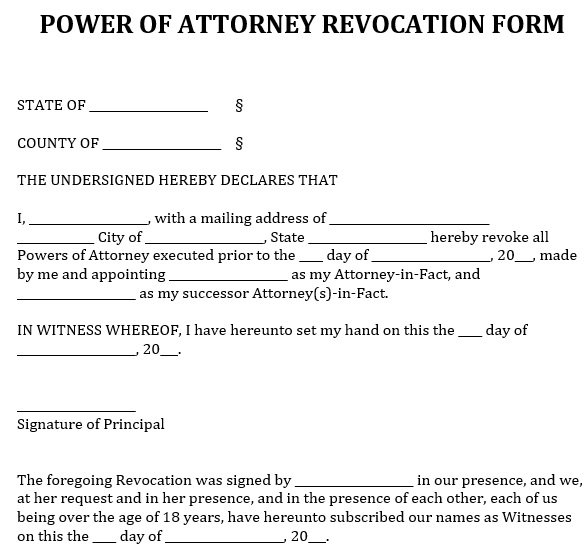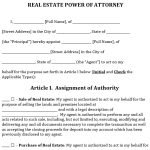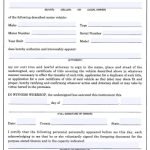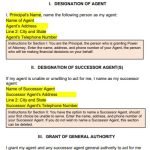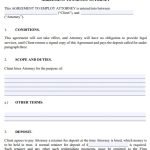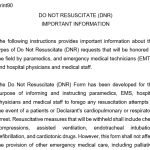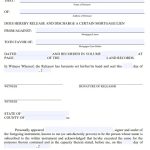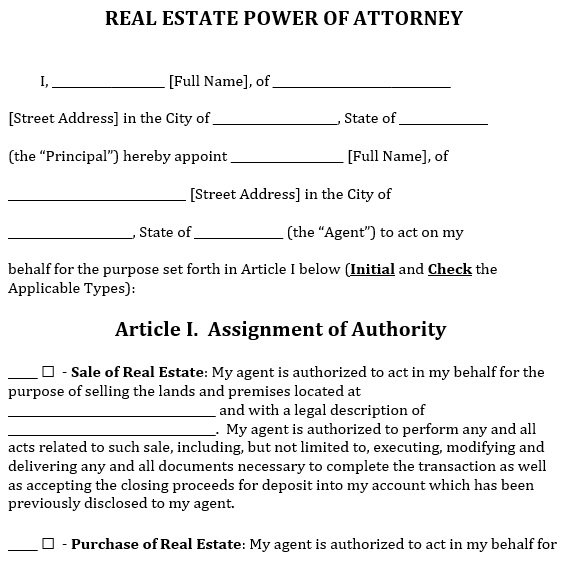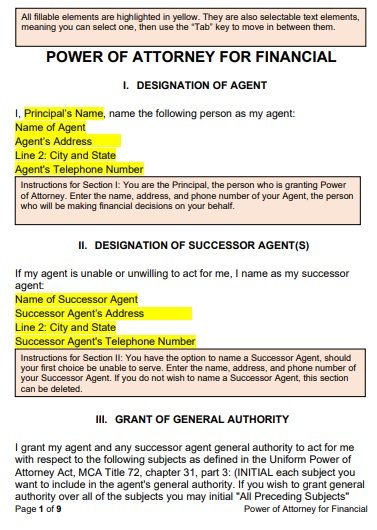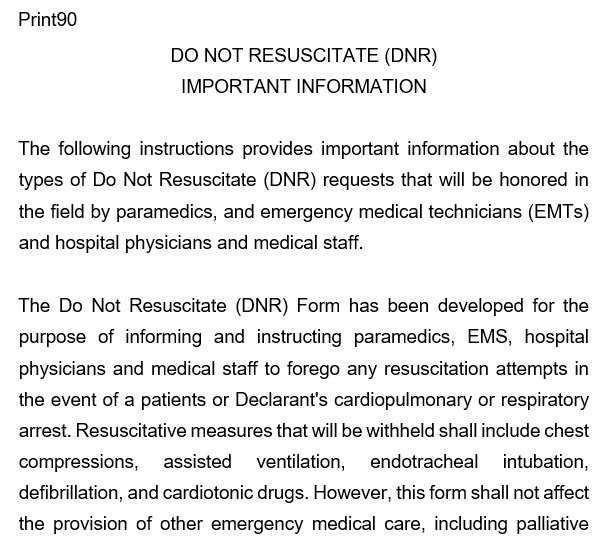To revoke a generally executed power of attorney, the chief should draft a revocation of power of attorney form, properly sign the document, and date it appropriately. Copies of the finished and the marked document ought to likewise be given to the specialist or lawyer as a matter of fact, and to establishments or substances utilizing the holder’s legal authority. A chief may likewise renounce their POA by disposing of each duplicate of any current POA documents and getting ready to execute another full power of attorney that will naturally override the first POA. Nonetheless, this strategy for dropping a POA isn’t generally suggested, as it might confuse the line. The wiping out or voiding of a POA is known as the revocation of power of attorney.
A power of attorney, which is normally abbreviated as a POA, is a report that gives another person (the specialist) critical command over the holder’s (the head’s) financial undertakings, medical care, and business decisions.
Who Can Revoke a Power of Attorney?
A principal holder might revoke a power of attorney if they never again need their representative to follow up for their benefit. The revocation process will shift depending on the type of POA at the time it is first executed. At the hour of voiding the document, the chief should be intellectually equipped to simply decide.
Also, the chief ought not to be crippled in any capacity. Considering that the principal is under an actual limitation or can’t convey really, somebody delegated by the court to follow up for the chief principal’s benefit can revoke their power of attorney. A specialist or lawyer, truth be told, may likewise end an overarching power of attorney in specific situations.
Reasons to Revoke a POA
Explicit reasons might require revoking a power of attorney. Notwithstanding, the most commonplace explanations behind voiding the document are:
- At the point when there has been misuse or maltreatment of the powers, the POA form grants. For instance, if there was an unnecessary impact applied on the holder by somebody other than the requester, or on the other hand, assuming the principal is crippled in some way.
- At the point when the agent has disregarded the conditions of a power of attorney by utilizing or endeavouring to capitalize on unnecessary leverage to drive the head to offer resources, move into an establishment for their well-being, go to financial counselling meetings, and so on.
- At the point when the specialist has been sentenced for a non-financial crime, especially one against the principal.
- In circumstances where the agent is not generally keen on holding a power of attorney.
- At the point when the principal has recovered their intellectual ability and needs to assume command over their undertakings.
- At the point when the specialist can never again deal with the chief’s undertakings because of accessibility issues, for example, when they habitually travel abroad.
- Assuming the connection between the principal and the agent changes and the holder no longer trusts that the agent will act to their greatest advantage, for example, in situations where the agent is the key’s mate and they have separated.
- Assuming the chief becomes crippled and their POA is non-tough, it ends naturally. Additionally, if the principal holder bites the dust, their POA is naturally dropped.
- The passing/insufficiency of a designated agent may likewise require revoking a current power of attorney.
- At last, assume a principal needs to modify the provisions of a current power of attorney. They might be compelled to disavow the current POA and make another record that will naturally override the old POA.
The most effective method to Revoke a Power of Attorney
Disavowing a power of attorney doesn’t need to be convoluted the same length as the guidelines for the revocation form are observed. Notwithstanding, before denying a POA, it is vital to accumulate all the relevant data to such an extent that it is simpler to continue with the revocation process.
When every one of the records and the vital data is promptly accessible, the accompanying advances ought to be taken to guarantee the denial of power of attorney is legitimate:
Stage 1: Prepare a document
In the beginning, a revocation form should be ready. There are different formats of the power of attorney revocation forms accessible on the web, and a holder might decide to finish them up freely. Nonetheless, a chief may likewise decide to recruit the administrations of a capable lawyer who will fill out the document for their benefit, basically on the off chance that they are uncertain of how to finish it up and wish to keep away from any legitimate issues that might emerge from voiding their power of attorney.
While finishing up the revocation form, it is critical to guarantee that the dates, names, and addresses of the agent and head and principal outsider data are referenced accurately. Furthermore, the state and region in which the POA is active ought to likewise be filled accurately.
Stage 2: Marking, authenticating and seeing the document
The principal holder ought to sign it after finishing up the revocation of the power of attorney form. The marking of the form ought to be finished before a legal official makes it public, and no less than two uninvolved witnesses ought to be available to observe its marking to demonstrate that the document is genuine.
The notary official must likewise sign the form, enter the district, and state where the revocation form is being marked, and place their authority seal on the document.
Stage 3: Record the document
When the POA revocation form is properly marked and authorized, it ought to be documented and recorded with the appropriate power of attorney or court vault to guarantee a record of the revocation activity.
Stage 4: Advise others
After the revoked power of attorney is kept in the important court library, copies of the original form ought to be made and given to the holder’s representative and all significant establishments, associations, and substances recently educated regarding a POA.
Copies of the revocation form ought to be hand-delivered to the concerned gatherings, and on the off chance that this is unimaginable, they ought to be sent through confirmed mail to guarantee that there is verification of receipt. This step is fundamental since it guarantees that every one of the concerned parties realizes that a power of attorney revocation form has been documented and recorded; consequently, they will act in like manner.
Step-by-step instructions to Write a Revocation of POA Form
The most common way of revoking a power of attorney is humane and ought to be manoeuvred carefully to stay away from any pointless lawful issues from here on out. In this way, before documenting the revocation form with the proper court vault, the directions for finishing up the form should be carefully followed. Furthermore, every one of the important details should be composed accurately.
The fundamental details to consolidate in the revocation of power of attorney form include:
- The province and state name: In this segment, the individual revoking a power of attorney ought to express the name of the district where the record will be given and the express that has the locale up it.
- Chief’s name, street number, and the first date: The chief’s complete name and postage information ought to likewise be expressly written as revocation of power of attorney. The date that the original power of attorney was marked and executed ought to likewise be given in the form of simply referring to.
- The name and address of the agent: The individual finishing the revocation form ought to fill in the appropriate data regarding the lawyer’s name, address, and pertinent proof number. The date the initial power of attorney was composed and recorded ought to likewise be provided in this segment. Moreover, a separate segment should be made for filling in the name and street numbers of an outsider or establishments using the POA, and their itemized data should be entered accurately.
- Witnesses’ name and street number: The chief’s name will be referenced in the future in this part, close by the viable repudiation date. Likewise, there will be an assignment for composing the witnesses’ names, and postage information, and a part for giving their substantial marks.
- Notary public: This segment ought to be finished up exhaustively and incorporate the legal official’s complete name, address, province, and state where they are approved to vouch for the marks of the head, specialist, and witnesses. The notary public ought to likewise sign, date, and seal the full power of attorney revocation form to make it lawfully restricting and enforceable.
Making the Revocation of Power of Attorney Valid
A revocation of power of attorney form should explicitly express that a power of attorney has been revoked. It ought to incorporate all the essential data about the holder, specialist, and outsiders’ personalities and postage information. Likewise, the date the POA became powerful, and the date it is revoked should likewise be expressed in the form.
To make the revocation valid, the chief should sign the form before two witnesses, and it ought to be authenticated. The report should then be documented and kept in the province where guaranteeing a record of the revocation was agreed upon. Plus, copies of the repudiated POA form ought to be made accessible to every significant individual and substance, including banks, government foundations, or offices that might have been informed already about legal authority.
The important’s representative ought to likewise be given duplicates of the revoked POA face to face or through assured mail. This will guarantee that each concerned party can play out their obligations fittingly, with no legitimate issues emerging from revoking a power of attorney.
Results of Not Revoking a Power of Attorney
Assume an individual doesn’t document a legitimate revocation of power of attorney form with the fitting court registry. All things considered, the holder of the previous POA will want to play out all private concerns or financial affairs with practically no obstruction from the head. Be that as it may, this can prompt significant legal issues.
The following are a few results of not revoking a power of attorney if it no longer fills the need:
Lost opportunity cost
Assume an individual doesn’t formally revoke their power of attorney. All things considered, they will relinquish the valuable chance to select another specialist or give admittance to some other person who can legitimately play out their obligations. This will influence that individual’s more right than wrong to give admittance to one more individual and prompt them to lose some other potential agreements.
Mental pain
Mental pain might come about because of being not able to control an individual’s issues. This is especially evident when a chief is going through a troublesome time in their life and can’t oversee it because of an existing power of attorney issue.
Expensive lawyer charges
Assume a primary holder is compelled to look for proficient lawful guidance regarding their full legal authority. All things considered, they might need to burn through over-the-top measures of cash on lawyer’s charges, which might have been stayed away from assuming the POA had been renounced actually.
Irreversible harm
On the off chance that a principal neglects to deny a POA after its motivation has been satisfied, extremely durable harm can happen concerning their monetary undertakings, which can be exorbitant.
printable power of attorney revocation form
free power of attorney revocation form
Conclusion
A Revocation of Power of Attorney form permits you to adjust your perspective on who you need to follow up for your benefit for the individual, medical services, business, or legitimate issues. As the name suggests, you can revoke or drop the power and authority recently granted to this individual, known as your “Agent”. Similarly, as a principal can make a legal authority (POA), a principal can likewise revoke that equivalent power.
A straightforward revocation of POA ought to by and large distinguish:
- Who was the past Specialist with the POA
- At the point when the POA ought to be successfully repudiated, generally right away
Frequently Asked Questions (FAQS)
No. An important holder has the privilege to end their overarching power of attorney, and they are not expected to make sense of why they chose to revoke the specialist’s powers. Nevertheless, the chief should advise the specialist of this revocation, which should be recorded as a hard copy.
No. The chief can revoke an executed POA since they hold the full right to drop it when they never again need their representative to follow up for their sake. By the by, it is urgent to take note of the fact that a few POAs can be restrictive, implying that the main’s capacity to revoke them is restricted. For a POA to be considered irrevocable, it should incorporate a proviso expressing that it is unalterable, and the chief can revoke it as indicated by the law.
Indeed. If a power of attorney is non-solid, it is consequently revoked upon the chief holder’s debilitation. Nonetheless, assuming the POA is strong, it will stay dynamic even after the chief is truly or intellectually debilitated.
In any case, assume a chief is considered clumsy because of a disease or other explanation. They have no grown-up family members or legal gatekeepers to follow up for their benefit. All things considered, the court will choose an able individual to address them during the revocation process and in the resulting methods concerning their power of attorney.
There are two primary classes of overarching legal authorities. The general power of attorney and the restricted power of attorney. The two sorts of POAs can be revoked whenever by the head, or it tends to be voided because of a few reasons, for example, when the chief kicks the bucket or is crippled, when a court nullifies it or when the specialist can never again complete the obligations as framed in the holder’s POA structure.
A POA is an authoritative document. In this manner, it should be properly revoked by furnishing every one of the concerned gatherings with a composed notification. Likewise, it should be documented in court to guarantee that there is a record of the denial for future reference.
Along these lines, the chief can be safeguarded from any lawful issues emerging from dropping the POA, and the substance mentioning admittance to the essential’s undertakings will have a record of the power of attorney revocation; consequently, they won’t permit the specialist to keep following up for the important’s sake.
Generally speaking, when a chief makes another overarching legal authority, it supersedes the past POA. Notwithstanding, you will need to ensure that your new power of attorney form expresses that all earlier reports are being renounced and tell your past lawyer as a matter of fact that their powers have been denied.
Moreover, all outsiders that might have been utilizing your earlier POA should likewise be given another duplicate of your POA. This is critical because elements, foundations, or people not educated about a revocation activity can’t be considered legitimately liable for activities taken in light of an earlier POA currently in their control.
For the revocation of power of attorney action to be legitimate, it should be marked, seen, authenticated, and recorded with the applicable court library. Nonetheless, for it to produce results, the chief should tell the past lawyer as a matter of fact of the revocation to such an extent that they can consent to the key’s orders. On the off chance that you don’t advise your representative regarding the revocation, their powers might in any case be genuine.
The best and most fitting method for educating your lawyer as a matter of fact regarding the revocation of their powers is through a composed notification. The powerful date of the revocation ought to likewise be given in the composed notification, and it ought to be hand-conveyed to them or sent using confirmed mail to guarantee that there is verification of receipt.
In any case, assuming conveyance face to face or via mail is beyond the realm of possibilities. All things considered, you can email the notification yet consider including a read receipt to check their receipt of the revocation form.
In specific occurrences, a specialist or lawyer truth be told can revoke their powers in a power of attorney. This is generally when they believe they can never again follow up in the interest of the foremost holder because of determined issues.
No. Isn’t permitted to revoke another lawyer’s powers, truth be told’s powers regardless of whether they have the position to pursue legitimate choices without speaking with their co-specialist. Just the chief can do as such. In any case, on the off chance that the chief is crippled and has a POA with two agents, the court can nullify the POA assuming a disavowal is essential.


